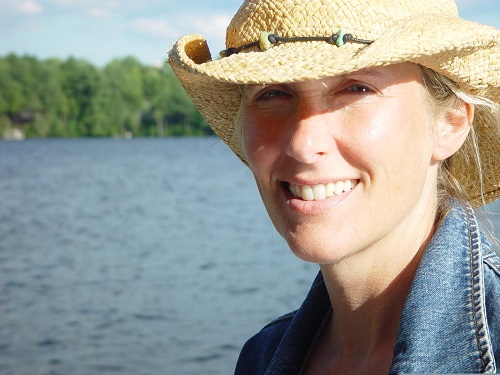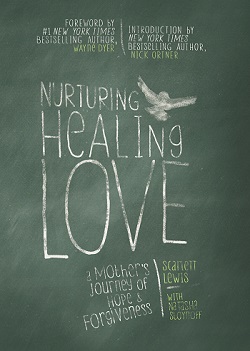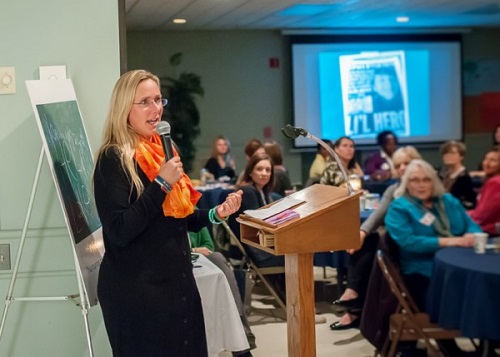
By Stacey Gualandi (@StaceyGualandi)/December 13, 2015
Photos Courtesy The Jesse Lewis Choose Love Foundation
@JesseLewisLove
In her book, Nurturing Healing Love, Scarlett Lewis writes about her very personal journey following the tragic death of her six-year-old son Jesse at the Sandy Hook Elementary School mass shooting in Newtown, Connecticut. Scarlett gave her book that title because those were the last three words Jesse wrote on his chalkboard before he was killed three years ago on December 14, 2012.
“It was such a message of comfort that he left for his family and friends. I also knew that it was a message of inspiration for the world.” Scarlett Lewis
Writing about what happened at Sandy Hook began as a way to cope, but for Scarlett it soon became a journey of forgiveness and hope. I was fortunate to talk to Scarlett on The Women’s Eye Radio Show when her book was released in 2013. Here is an excerpt from that interview…
STACEY: This book is a great exercise in how to cope when something absolutely horrific happens. Are you glad you actually wrote it?
 SCARLETT: The book has been an incredible, amazing, healing journey for me.
SCARLETT: The book has been an incredible, amazing, healing journey for me.
STACEY: What prompted the title?
SCARLETT: I was living at my mom’s house for about a month after the tragedy. I couldn’t imagine coming back to our little snug farmhouse in Sandy Hook and not having vibrant Jesse, whose energy filled every corner of the room.
On one of our sojourns home when I was getting Jesse’s clothes for his funeral–this unimaginable thing I had to do at this time–I came across this message on the kitchen chalkboard. It clearly said, although it was not phonetically spelled, “nurturing,” “healing,” “love.”
I knew that was not in his vernacular and that it was a message from his spirit because I just don’t think his six-year-old cognitive brain would have thought of those words and put them all together.
It was such a message of comfort that he left for his family and friends. I also knew that it was a message of inspiration for the world. Because of the very public way this tragedy happened, the whole world reached out in the most miraculous show of compassion.
I say that because I was the recipient of that. I feel a responsibility along with Jesse’s message of “nurturing, healing, love” to spread that. It is my purpose in life now. I’m very blessed to have it.
STACEY: Where would Jesse, at six years old, have gotten the “healing nurturing love” words from?
SCARLETT: I know. It’s funny. People ask, “Do you walk around saying, ‘nurturing healing love?’” I didn’t. I was actually the only single parent of the parents who had children die. I have a full-time job. We had the usual arguments at home, rushing around for breakfast and dinner and weekends filled with fun.
It didn’t come from me. And, I know it didn’t come from his dad, so the only other possible place it could have come from was a spiritual knowing that he didn’t have much time left. With all the other messages that are in the book, I believe that was the case. I do believe there was a shift in consciousness on December 14.
“That event changed people in a way that some can’t describe–some do unfortunately know what this is like–but I believe people are on a different path now. It is a path of nurturing, healing, love. People are choosing love. It’s been a beautiful thing to see. It’s been very healing for me.”
STACEY: My dad died on December 14th. It’s always difficult knowing that day is coming. How do you deal with the anniversary on such a huge scale, a world scale?
SCARLETT: I did not realize what a big deal the anniversary would be. I think back, and I go “Wow, this day that last year I was with Jesse.” On the last Thanksgiving weekend before the shooting, Jesse was urging me to get a tree. He was my decorations guy. Thank goodness, I did. He wanted a train. I got a train for him. He got one night to play with the train, thank goodness.
After it happened, I just wanted to get away; I didn’t want to be in Sandy Hook. I wanted to be on a beach somewhere just having a lot of fun. That was Jesse’s message to his brother, JT, “Have a lot of fun!”
But I had this angst. And my friend said,“What’s in your heart to do?” My heart was willing to stay and face it and spread the message of “healing nurturing love.” There’s a kind of resilience that there’s a craving for. And, I wanted to share it.
STACEY: In your book you say this could be a life sentence of sorrow. Do you think that is true?
SCARLETT: I think it absolutely can be. I think you have to remember you can’t control some of the things that happen to you, regardless of the choices that you make. You can always control how you react to situations that happen.
The amazing thing is that it’s a choice. The choice in handling tragedy is also just that. I knew I wanted to survive. I remember blatantly making the decision in my mom’s kitchen. Adam killed Jesse but he did not kill JT and he did not kill me. I am going to be the best mother I can be. I am going to survive well. That’s my mantra.
EYE: You said a prayer every day from the moment he was born because you had this weird feeling that he might be taken away from you some day. There’s the picture he drew of a little boy with angel wings and then there is an evil man standing behind him. Do you think in some way that he knew, or he was psychic in some way?
SCARLETT: I do not think it was psychic. We all have a spiritual awareness but we are all so busy, so distracted. We don’t access it. When we slow down, we have it. I think I had glimpses of it when I would say the Jesse prayer, ”Dear Jesus, he’s a gift. Please don’t take him from me.”
I am not saying I was wondering if he was going to die early. Not at all. I just didn’t question it; I just said that prayer. I don’t think Jesse, when he wrote “nurturing healing love” and drew the angel and the bad man, was cognitively aware that something was going to happen.
“But I do think that spiritually he knew, and I believe that of course he had a purpose on earth and I believe he carried it out, and he carried it out very bravely. It very well might have been saving those children. I am very proud of him. I only hope that I can carry out my mission as bravely as he did.”
STACEY: You mention your son’s bravery. Your son was yelling, “People go!” and saving other children by being there, standing and letting them run out of the classroom as the shooter continued. Hearing that, there is a comfort, but can you forgive something like that? You write that forgiveness is like cutting a cord to pain. Can you do that?
SCARLETT: I have. I think forgiveness is this hugely overlooked quality and value that is a must-have for a meaningful and happy life. There are all sorts of transgressions we have to forgive. For me, it’s interesting because I talk about forgiveness with everyone from kindergartners to prisoners about “nurturing healing love.”
I was talking to an outreach group at one point when a boy raised his hand and asked, ”What is forgiveness?” I said it is cutting the cord to pain; it’s not condoning what somebody did, but it is freeing yourself to move forward.
His next question was, “How long did it take for you to forgive the guy who killed your son?” I think when we think about forgiveness, we think it is like a snap decision that we are going to decide to do, like waking up one morning and deciding I am going to forgive Adam Lanza and that’s it.

STACEY: How does it happen?
SCARLETT: It is probably a process that I am going to go through for the rest of my life. I forgive him every day and sometimes I have to forgive him a hundred times a day. Sometimes I don’t make that choice to do it.
When I don’t and I feel that anger settling on me like a black dark heavy apron, it doesn’t feel good. It’s not good for me; it’s not good for JT. It’s not good for the people around me. It’s certainly not good for my purpose in life, which is “nurturing healing love.”
STACEY: How do you handle the angry moments?
SCARLETT: I take a step back and I take a deep breath and I choose to forgive. As soon as I say that, I’m free. It is such an important part of the equation with healing and joy, which is feeling gratitude regardless of your situation.
“Believe it or not, through the process of grieving for Jesse, I had to forgive myself for things that I felt I should have done, or didn’t do.”
STACEY: How did you decide what to do to stop this tragedy from happening again?
SCARLETT: I thought a way to stop it would be to go into schools, to talk with teachers and parents and develop lessons to let kids know they have control of their thoughts. I want to let them know that those 60,000 thoughts that you have in your head very day, the same ones you had last year or five years ago, are not you. They are not who you are.
“You can make the world a better place by doing this. So, going into schools and teaching about gratitude, speaking about forgiveness, teaching about compassion is what I do.”
Compassion is not just empathy; there is an action component where you ease someone else’s suffering and teach about character and values.
STACEY: Do you think you have changed from the person you were before this happened?
SCARLETT: I certainly like the person a lot better that I am today. Would I give all the changes back to have Jesse back? In two seconds. That’s not going to happen so I definitely see this incredible personal growth that is happening in me.
I am sorry it took the loss of my precious son to really get me to wake up and understand how important that being of service to others really is; that is really the key to happiness. I have dedicated my life to that now. That’s how I’m surviving and having happy moments. Gratitude, forgiveness, compassion with action under the umbrella of service for others are all choosing love.
STACEY: Do you think Jesse is proud of his mommy?
SCARLETT: I do. I feel very connected to him in spreading his chalkboard message. There is no way that I could have published a book in eight months and had Wayne Dyer write the forward, so I know he is pulling strings for me there.
I feel his spirit fingertips on my back saying, “C’mon Mom, let’s go. Let’s spread the message. That’s what we’re doing now.” I feel very much like it’s teamwork with him. For that I am so grateful. I feel his presence every day through my work and I am very grateful.
Incredibly people from all over the world have e-mailed me through the website and said, “I am reading the book and feel Jesse’s presence. Something like this has never happened to me.” I love that. It’s his light all over. I know he wants to help everyone heal.
STACEY: I wish I’d had the honor of meeting your son. I am so glad to be able to share the message. I sure will practice what you preach. Nurturing Healing Love is the book and I highly recommend it.



Leave a Reply